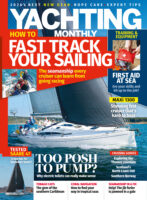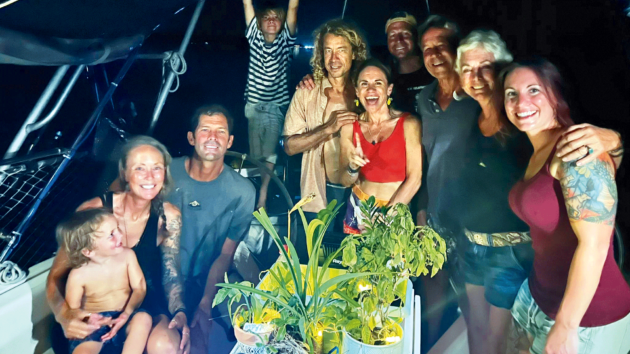According to Paul Trammell, friends, help, and fun evenings await those willing to risk it when cruising. Here are his tips
Sailing singlehanded as I do, I place a high value on my solitude and am quite happy to spend many consecutive days alone. However, sailing alone amplifies the value of meeting other sailors and spending time talking to other people.
Everybody needs friends, it’s simply part of being human. For some of us, making friends is easy, for others, it doesn’t come naturally. Luckily for the latter type, it’s easy to make friends while cruising.
As sailors, we are all confined to our boats, and to some extent we crave a bit more human interaction than we find among our crew.

Complimenting a sailor on their boat is the easiest way to open a conversation. Here, Paul’s Cartwright 40 is anchored in the fjords of Newfoundland
The easiest way to make friends at anchor is to simply dinghy over to a neighbouring boat and say ‘hello’. Introduce yourself and see what happens. Almost without fail, you will be able to engage in a conversation. Sometimes you’ll even be invited aboard.
Only the most ornery of sailors will spurn your efforts. Even if this happens, and it almost never does, you will have done them some good by providing an example of friendliness. Perhaps the old badger will give it a try in the future, and you will have made the world a better place.
Finding friends while cruising: Flattery every time
A surefire way to any sailor’s heart is to compliment their boat. Try this strategy: dinghy over and ask what kind of boat they are on. Whatever they say, respond with, ‘She’s a beautiful boat.’

If you’re going fishing, or even spearfishing, ask others to join you
If you are familiar with the model, say something good about it, like, ‘Ah, those are fine boats, I’ve heard they’re fast on a close reach.’ They will inevitably smile and associate you with a positive emotion. This is a great foundation for a new friendship.
While it’s tempting to judge people by their sailing boats, and to only approach boats that we like, I have met and made friends with sailors on boats that are vastly different to mine. Making friends is not facilitated by being judgmental.

If your AIS is on and the data includes your vessel name, others will know who to call to ask for advice
Most boats have their home port written on the hull. If you spot a boat from your neck of the woods, or anywhere you have a relation to, you’ve got an easy in. Stop by and say, ‘Are you from Falmouth? I used to live there.’
Even if it’s somewhere you don’t like, it’s okay to tell a little white lie in this instance, like, ‘Are you from Edinburgh? What a wonderful city. I was there over Christmas a few years ago and had a great time!’
You can say this, even though really you were freezing while you were in Edinburgh and wished your girlfriend’s friend’s wedding was in the south of France instead.
An invitation
Invite your neighbours to join you in whatever activity it is you are about to go and do, like going into town, or in the warm waters where I currently cruise, snorkeling, surfing, or spearfishing.

Share your contact details so people can stay in touch even when you sail away
I recently rowed over to a neighbouring boat that I recognised from a previous anchorage and invited them to go spearfishing. The captain said nobody on his boat had the gear or even knew how to spearfish, but that his son might want to go.
His son was in the water, snorkeling around their boat at that moment, and was excited at the prospect of an outing. He got in a kayak and followed me as I rowed out to a nearby reef, saying he wanted to watch and learn all about spearfishing.

With the help of a new friend, Paul caught his biggest fish to date
It turned out that he was a good-luck charm. He pointed out two big lobsters and the biggest grouper I’ve ever speared. Without inviting him, I might have returned to the boat empty handed. I think what he ‘learned’ was that he had a good eye for lobster and grouper (oddly enough, he said he didn’t know what kind of fish it was).
After we returned, I invited him and his parents over for dinner, and we enjoyed a lobster and grouper jambalaya together. I also got some action photos out of the adventure, since he was carrying an underwater camera.
Article continues below…
Cruising around the Bijagos islands: Taking a break from sailing around the world in remote regions
Situated at the mouth of many rivers in Guinea-Bissau, the Bijagos archipelago is one of Africa’s most isolated maritime regions.…
Sailing singlehanded across oceans: lessons learned
Chris Ayres realised a childhood dream when he sailed from Britain to New Zealand, via Panama, in a 28ft yacht…
Dinghy gambit
When anchored with lots of other boats around, it’s fairly common for dinghies to motor by. Simply waving to them as they pass indicates that you are a friendly sailor open to meeting new people.
There’s a good chance they’ll stop by and compliment your boat or tell you how much fun they had while visiting your home port. Invite them aboard and brew up a pot of tea.
If you are lucky enough to have a sailing dinghy, sail it around the anchorage. No sailor can resist watching a sailing dinghy as it slowly and silently cruises by.

Pottering around in a dinghy is a surefire way to make contact
Smile and wave as you pass by, or heave-to and ask a question about their boat. The next time they see you, they’ll say, ‘Are you the one I saw sailing the dinghy yesterday?’ and a conversation is started, and a new friend is made.
Listening watch
Leave your VHF radio on when anchored, if you don’t mind the chatter. Someone might have recognised you and wish to say hello, or another might be trying to organise a potluck or jam session – more common in the Caribbean than in the UK perhaps.
If you are the organising type, you can get on the VHF radio and say something like, ‘All sailboats in Hatchet Bay, all sailboats in Hatchet Bay, please switch to 72 for a general announcement.’ Then introduce yourself with your boat’s name and then suggest a potluck or beach barbecue at 1700.

Put the kettle on and offer a cuppa. Few will say no
If you are more inclined, you can dinghy to every boat in the anchorage and invite everyone in person. This is more effective, since a lot of sailors don’t leave their radios on, and you’ll get to meet everyone, even if they don’t want to come to your jam session/sundowners/drinks and nibbles (depending on how British you’re feeling). If you can dinghy to one boat and introduce yourself, then you can do it to all the boats.
Keep in touch
Make a business card with a photo of your boat, perhaps with you standing at the bow smiling and waving, along with your boat’s name and your contact information. Keep these on hand and give them to whoever you meet (assuming you like them).

If you have a problem, ask for help, and if you’re able to help, give it freely.
That’s just how it works
Once you’ve met someone, if you have their email address, take a picture of their boat as they sail away, then send them the photo. Everyone likes pictures of themselves sailing and these pictures are particularly valued. The cover of my book Journey to the Ragged Islands is just such a photo.
A helping hand
Offer to help anyone who needs it. If you are good at freediving, and someone’s anchor is stuck, or they have a line in their propeller, see this as an opportunity to make a friend. Helping other people always feels good, and it makes the world a better place. People remember that a stranger helped them, and they feel indebted, which makes them look out for someone else who needs a hand.

A potluck on the beach is always enjoyable and often leads to new friendships
Good deeds beget other good deeds and helping someone out of a jam makes you a friend. But remember this: never do a good deed and then ask for something in return.
This is a good way to destroy people’s faith in humanity. Don’t even insinuate payment.
Time for tea
Invite people aboard. It’s always fun to see other boats, and we can learn from each other about our boats. When you invite someone aboard and offer them a cup of tea, you are sure to have made a new friend.

Leave your radio on at anchor and other boats may get in touch
You can swap stories, discuss gear or techniques, and share information about anchorages, good snorkeling reefs, spearfishing hot-spots, or beaches to surf.
AIS introductions
My sailboat is equipped with an AIS that transmits. This is a great piece of safety gear, but it also facilitates making friends.
Since other sailors can see the name of my boat on their chartplotter, they can call me by name. Knowing another boat’s name makes us feel familiar right away.
I was recently asked about the depth of a channel I was about to enter. I told the other boat what I knew. A few days later in an anchorage, they showed up in their dinghy, introduced themselves, and we made plans to spearfish together.

Paul cruises between Newfoundland and the Caribbean
Since their dinghy was way nicer than mine, we covered a lot of territory that I would not have been able to access in my sailing and rowing dinghy, and we all had fresh seafood for dinner.
Greasing the wheels
Remember to be humble. Some of us are handicapped at making friends because we like to expound our own virtues. It’s much easier to like someone who is humble, and ironically, it’s the boastful ones who end up looking foolish while humble people are often the ones who gain our lasting respect.
And finally, remember to smile when you meet people. Smiles beget smiles, and when you make someone smile, they associate you with a good feeling. Smiling makes people feel welcome, and lets them know that you are happy they dinghied over to say ‘hello’.
Enjoyed reading this?
A subscription to Yachting Monthly magazine costs around 40% less than the cover price, so you can save money compared to buying single issues.
Print and digital editions are available through Magazines Direct – where you can also find the latest deals.
YM is packed with information to help you get the most from your time on the water.
-
-
- Take your seamanship to the next level with tips, advice and skills from our experts
- Impartial in-depth reviews of the latest yachts and equipment
- Cruising guides to help you reach those dream destinations
-
Follow us on Facebook, Twitter and Instagram.






